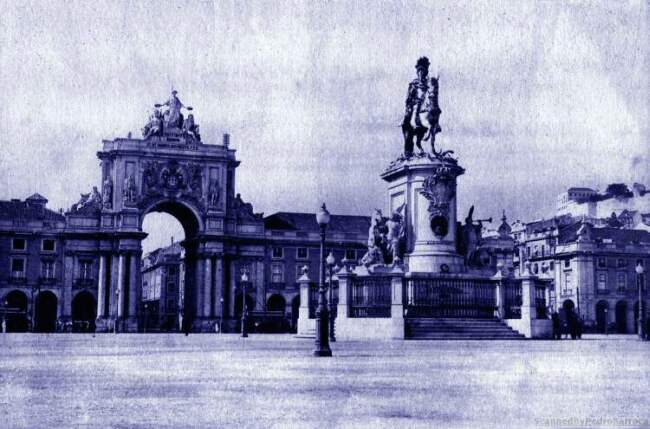 |
When the Earth shook... |
In 1750, King D. José, son of D. João V, nominated the Marquês de Pombal
as Prime Minister. It would be this man that would leave his imprint on
the second half of the Portuguese 18th Century, not only through having
reinforced the power of the monarchy, which historians have called
«Enlightened Despotism», but also, and chiefly, through his actions
after the violent earthquake and the ravaging seaquake which in 1755
destroyed the city of Lisbon.
The disaster was terrible
and the number of deaths rose to 90 thousand, around a third of the
population of Lisbon. More than 85 per cent of the buildings of the
city were destroyed, including famous palaces, libraries, convents,
churches and hospitals. A number of buildings which had suffered minor
damage from the earthquake were destroyed in the fire which followed
the earthquake. The recently constructed Opera House, opened only six
months previously, burned in a few hours. The Royal Palace, which was
situated on the bank of the Tagus, on the site of the present day
Terreiro do Paço, disappeared forever thanks to the aftershocks and 20
metre waves thrown out by the river Tagus. Inside, a library of 70
thousand volumes and hundreds of works of art, including paintings by
Titian, Rubens and Correggio, amongst many other precious items, were
lost in the ruins, along with the sumptuous Royal Archive, containing
unique documents concerning Oceanic exploration.
In a flash of
lucidity, the Marquês de Pombal ordered the city to be rebuilt,
following a strict urban plan, an example of which being the present
day Baixa, downtown, part of Lisbon, and endowing the new buildings
with anti-seismic structures.
An ambitious programme of
reforms was carried out at the national level, which led to an increase
in production relative to foreign competition, the development of
colonial trade and incentives for expansion in manufacturing. The
company for the Agriculture and Vineyard of the Alto Douro was
established under the scope of this policy, to which the Minister gave
tax exemptions for exports and commerce with the colonies, and in this
way established the first demarcated wine growing area in the world.
At
the same time, the Marquês established fiscal stimuli to set up small
manufacturing units aimed at the national Portuguese market, of which
the colonies also formed a part. This protectionist policy also covered
measures which favoured the importation of primary materials and which
considered imported products to be similar to those of Portuguese
manufacture. As a result, within the country hundreds of small
manufacturing units producing a wide range of goods were set up. He
also set up the Royal Bank and established a new structure for
administering and collecting taxes.
The reformist activities of
Pombal also included actions within the scope of politics and the
State, and he worked tirelessly to strengthen the absolutism of the
King and in fighting those sectors and institutions which could have
weakened him. He reduced the power of the Church, and made the
Inquisition answerable to the State and in 1759 expelled the Jesuits
from the metropolis and the colonies and confiscated their goods.
 Iberian Union Iberian Union |
The Court in Brazil 
|

